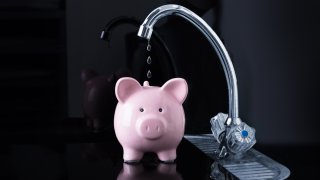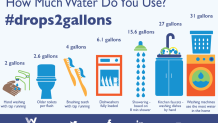

The following content has been created in partnership with WSSC Water. This content does not represent the opinions of the NBC Washington news team. Click here to learn more about WSSC Water.
Many of life’s commodities cost what they cost no matter what you do. When it comes to water, though, you’re in control. Adopt the right kind of habits, and you can lower your home water bill. Plus, the amount of cash you save correlates to how much water you save. So, you’re not just watching your budget; you’re helping conserve this precious natural resource. (About 1.7 trillion gallons of water are wasted every year, according to the U.S. Geological Survey.)
Now is a great time to take a closer look at how much you spend on water, given that you may have more people spending more time at home due to COVID-19. If you’re wondering what you can do to spend less on water, follow these tips.
329 medal events. 32 sports. Endless drama. Catch all the action at the Paris Olympics. Sign up for our free Olympics Headlines newsletter.
Fix leaky toilets: The diabolical thing about leaky toilets is how stealthy they are. Rather than dripping water onto the bathroom floor, which you may see or hear, toilets can malfunction so that their tanks keep releasing water into and refilling the bowl (a sort of perpetual flush). A bad flapper is usually the cause. An average toilet leak can waste 200 gallons of water per day—that’s 6,000 gallons every month! One leaky toilet can add more than $300 to a quarterly bill.
Fix those leaks: Speaking of leaking toilets, finding and repairing all the plumbing leaks around your house is a great way to save money and conserve water.
Don’t run the bathroom faucet: Remember: You can shave and brush your teeth without running water the whole time. You can even wash your hands with just a splash at the beginning and a rinse at the end. Changing such habits saves gallons a day.
Don’t run the kitchen faucet: Running the tap for five minutes while washing dishes can waste 10 gallons of water. Better to scrub with a soapy sponge then rinse at the end.
Better yet, use the dishwasher: Washing a load of dishes by hand with running water can use 20 to 30 gallons of water. Loading them in a modern dishwasher, on the other hand, may only use four to six gallons.
And before loading that dishwasher: Scrape food off plates; don't rinse them off.
Add aerators to faucets: While you’re there at the sink, consider installing an aerator on your faucet. Aerators add more air to the water flow and increase water productivity, reducing splashing, for instance

Take showers, not baths: Typically, a 10-minute shower uses 25 gallons of water, compared to up to 50 gallons for a bath. Taking a five-minute shower, therefore, cuts that usage in half.
Keep water in the fridge: Rather than running water until it cools, pour from a refrigerated pitcher when you want a drink.
Laundry lessons: When doing laundry, know the correct size of your load. Don’t choose the extra-large load setting when you’re just washing one bath towel.
Opt for low flow: Swapping out your old toilet, dishwasher, and washing machine for low-flow models can save a lot of water and a lot of money!
Be smart outdoors: There are plenty of ways to reduce your outdoor water use:
- Plant native shrubs that require less watering
- Save moisture by using mulch
- Use a broom, not a hose, to clean patios, sidewalks, and driveways
- If you water your lawn often, consider a sub-meter to avoid sewer charges on your outside water use

WSSC Water offers other helpful water-saving tips here. And speaking of helpful, WSSC Water is here to help if you are behind on your water bill. Water service turnoffs for delinquent customers have resumed. To avoid a service disruption, please contact them immediately or click here.

